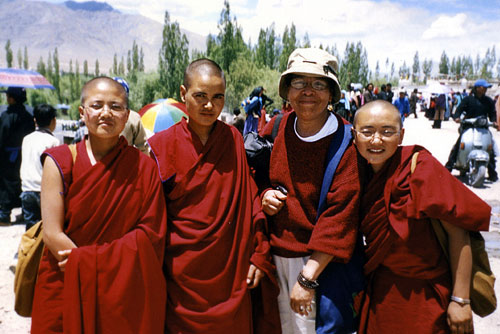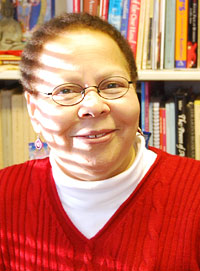Willis Honored for Efforts with Buddhist Nuns

In the sparsely populated, mountainous region of Ladakh, India, elderly Buddhist nuns are suffering from isolation, illiteracy and lack of respect from their communities. These women, who spent their lives serving their family or working as laborers, have rarely had the opportunity to become ordained or to worship in a monastery like the highly regarded male monks.
“These women have been devalued from the beginning,” says Jan Willis, professor of religion, professor of East Asian studies. “All they’ve ever wanted to do is serve the dharma and study, but instead, they’ve become servants of their community, or helpers for the monks.”

Willis, who has devoted part of the last seven years to helping a group of elderly Ladakhi nuns, is being honored as an “Outstanding Woman in Buddhism” for the year 2009 for making an “exceptional contribution to Buddhism.” She was selected by a distinguished committee of Buddhist scholars and practitioners for the award.
The award is being presented by the Outstanding Women in Buddhism Awards Committee which, according to their website, is “part of an international women’s movement calling for change and celebrating the acts of courage and determination by women in the history of Buddhism.”
Willis will be honored at the Outstanding Women in Buddhism Awards Ceremony to be held in conjunction with the United Nations’ International Women’s Day. The ceremony will be held at the Association for the Promotion for the Status of Women in Don Muang, Bangkok, Thailand on March 6.
Willis joins 18 other women who have been honored as “Buddhist women masters” by the Thai-based organization this year. Past American honorees include Joanna Macy, a long-time Buddhist peace activist, environmentalist and deep ecologist, who won the award in 2007 and Thubten Chodron, who was ordained within the Tibetan Buddhist Order. Willis uses books written by Macy as texts for some of her classes.
Willis first encountered the Ladakh nun population in 1995, when she was the invited keynote speaker at an international conference on Buddhist women held in Leh, Ladakh. There, nuns are allowed to be “enrobed” after taking only five vows. To become fully ordained, a nun must take 327 vows, whereas a monk takes only 263 vows.
A Ladakhi nun may spend her life tending sheep, tilling fields or building roads through the mountains, a labor-intensive, dangerous and grueling job that “allows little time for communal living or spiritual practice.”
“So any person on the street may see a nun, and assume that she has only taken the five vows of a Buddhist layperson,” Willis explains. “They give her no respect.”
Willis made several trips back to Ladakh and became acquainted with the Ladakh Nuns Association, an organization created to offer education, spiritual life, networks and nunneries for the approximately 1,000 nuns in the country.
“In 2003 I asked, ‘How can I, an academic from the West, be of help to these women?” Willis recalls. The head of the Ladakh Nuns Association replied, “Write about our situation.” Willis began to do so. Her 2004 essay in Buddhadharma is one example.
In addition, Willis was elected president of the Dutch Foundation for Ladakhi Nuns which held fund-raisers to help a group of 27 nuns between the ages of 42 and 83 from Thikse, Ladakh. She and fellow volunteers from around the world raised more than 25,000 Euros, or $31,988 dollars within the first few years by selling photos of the nuns and of Ladakh scenery.
The funds are now supporting educational programs and a nunnery’s kitchen so women can live in the facility. To date, 20 have found a permanent residence in the new nunnery. The aim is eventually to house 50 there.
“These were women who spent their entire life as servants, building roads across the mountains. They couldn’t read or write. They were never allowed to be part of a spiritual community. Now a couple of them are training to become doctors,” Willis says. “I cannot wait to return and see how everything is going and working for the women there.”

